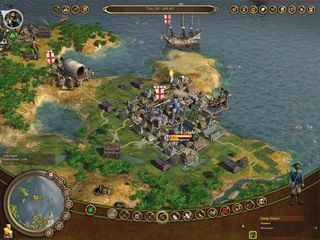Four legends who changed gaming
John Carmack, Alexey Pajitnov, Sid Meier and Nolan Bushnell interviewed

Civilization creator, Sid Meier has a place in not one, but two Halls of Fame. He was the second person to be inducted into the Academy of Interactive Arts and Sciences' Hall of Fame and also has a place in the Computer Museum of America's Hall of Fame. Along with Bill Stealey, he developed MicroProse Software in 1982 and went on to create gaming delights such as Spitfire Ace (1984), Pirates! (1987) and, of course, Civilization (1991).
The champion of tight gameplay and addictive entertainment, he's inspired other legends, smashed genre expectations and is one of the nicest people you'll ever meet.
Tamsin Oxford: How does it feel to be considered a gaming legend?
Sid Meier: I'm humbled by the compliment and I'm fortunate that even after nearly 30 years, I still love coming into the office every day and making games. I plan to design and program for a long time to come – it's the greatest job in the world.
TO: Pirates! and Civilizations have been touted as some of the greatest games of all time and have influenced a generation of gamers. Did you ever expect this to happen and how does that make you feel?
SM: When we were making those games our focus was on creating a fun experience for the player. With Pirates! we knew the design was unique because we were combining a number of established genres into one game. The end result was a fun, open-ended game that appealed to a wide variety of players.
We knew Civilization was a big undertaking in that making a fun game about all of human history was a challenge. Our goal in designing the original Civ was to make the player the central figure and present them with lots of interesting choices and challenging decisions to make that would determine their success in the game. We hoped the games would deliver many hours of fun to players, but never expected they'd receive such high praise. I'm really happy people feel that way.
Get daily insight, inspiration and deals in your inbox
Sign up for breaking news, reviews, opinion, top tech deals, and more.
TO: What was the inspiration for creating Pirates!?
SM: Many of the games I've made are based on topics that I was interested in as a kid. I played pirate games, read pirate books and watched old Errol Flynn pirate movies when I was young and I thought it would be great to create a computer game based on this fascinating cast of characters.
It's a topic that seems to appeal to people of all ages, so we were confident that the audience was there for the game. We wanted to give players a chance to enter the world of pirates in an open-ended environment that allowed them to create their own story and have a new experience every time they played. That seems to be what made the game so popular.
TO: Can you tell me one thing about those early, early days at the offices of MicroProse that nobody else knows?
SM: In the very early days of MicroProse it was just me and Bill Stealey in the company. I would create the games, copy them onto floppy disks, place them in zip-lock bags and Bill would load them in his car and drive up and down the east coast selling them to retailers. He'd stop at a pay phone every so often to give me an update on how sales were going. And that was the start of the business.
TO: With games becoming shorter and more about instant gratification, do you think that the younger market appreciates games with the depth and scope of Civilization?
SM: We hope so! From what we know about Civ players it seems that they come from all different age groups and from all over the world. The great thing about today's gaming is that people have a lot of choices when it comes to the types of games they want to play and what platform they want to use to play them. I think people can enjoy short game experiences on an iPhone, for instance, and still go home to their PC and play a longer game like Civ. There's plenty of room for all kinds of videogames.
TO: Would you ever consider returning to the fold of the flight sim and what exciting new ideas are you formulating at the moment?
SM: I'm lucky to have the creative freedom to explore lots of game ideas, so I wouldn't rule out any topic for future games. Right now I'm working on Civilization Network - a Civ game for Facebook. I'm leading the design and programming and have a great team at Firaxis working with me.
Civ Network will offer the fun, addictive gameplay that defines Civ, in a fully persistent environment and it'll be free to play. We'll announce a closed beta soon and the full game will be available in 2010 (sorry for the shameless plug!). (That's not a problem, we can't wait to play it in the PCF offices).
TO: You're famous for the design approach of rapid prototyping and constant iteration. Is this still a process you use and would you recommend it to younger developers?
SM: It's a process that has worked well for us for many years and I do recommend it to young developers. If you can create a basic prototype that's fun to play (even without exciting graphics and fully implemented features), then you have a great foundation for a fun game.
The iterative process – play, improve, play improve – ensures that you remain focused on the gameplay experience every step of the way as you keep what works and get rid of what doesn't.

TO: What do you see as the future of gaming, what wonders are left to be uncovered?
SM: The recent popularity of iPhone and social network games creates interesting opportunities for game developers. There are more people playing games, and the idea that games can be played any time and any place means people are playing games more often and always looking for new experiences. That creates a perfect world for game makers.
TO: What game are you playing right now?
SM: Right now I'm playing Batman: Arkham Asylum on my Xbox 360 and I'm really enjoying it. It's got great atmosphere and Rocksteady Studios did a good job staying true to the spirit of Batman.











